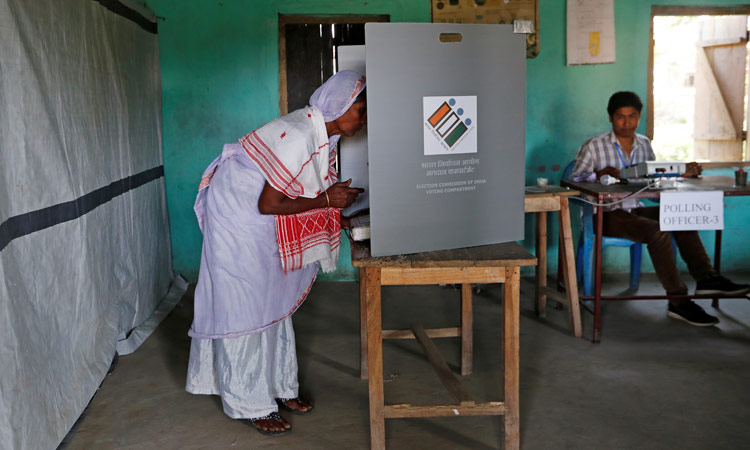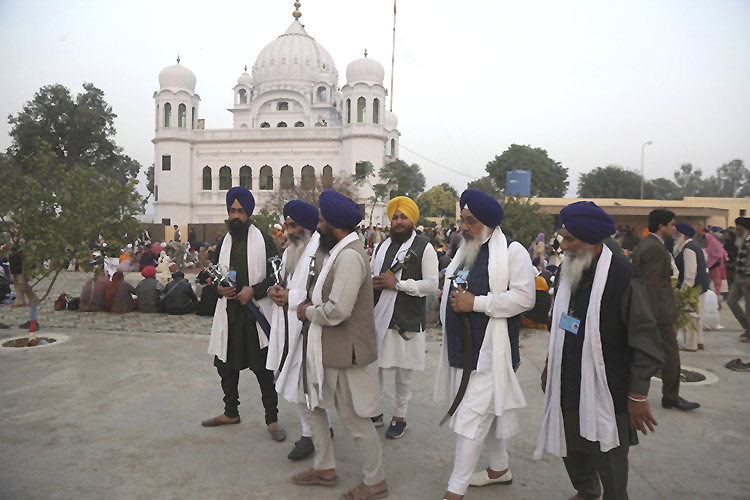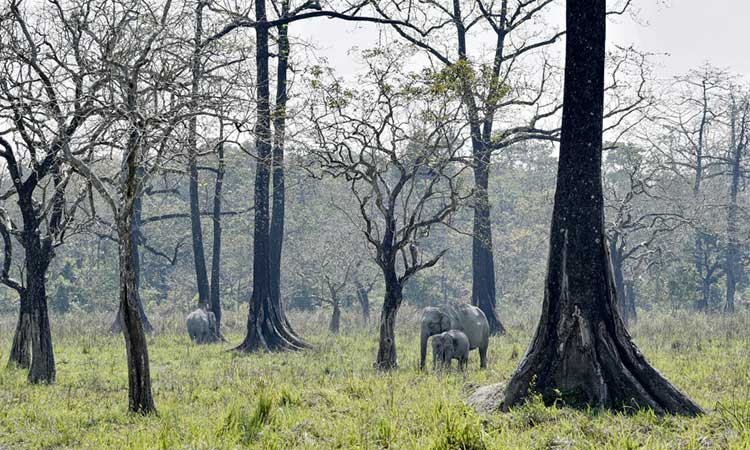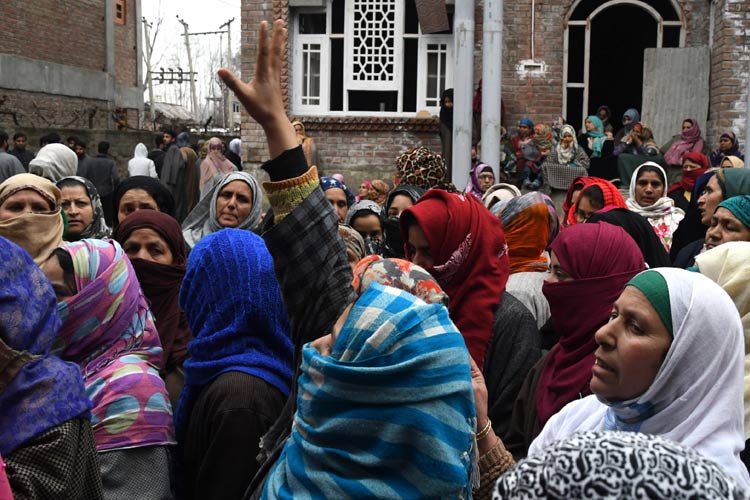Dark clouds hover over constitutional bodies
BRP Bhaskar

A woman casts her vote in a polling station. File
As India goes through a general election, the outcome of which may determine its future as a secular democracy, unseemly developments have cast long shadows over two constitutional institutions.
One of the institutions is the Election Commission which has the responsibility to conduct free and fair elections. The other is the Supreme Court or, more precisely, its powerful head, Chief Justice Ranjan Gogoi.
Justice Gogoi linked the sexual harassment allegation against him to the elections, saying it has surfaced when important cases are coming up in the election month.
The Election Commission had earned an early reputation for fairness. In the very first elections, held in 1952, the Communist Party of India emerged as the main opposition. In the second elections in 1957 the CPI came to power through the ballot in Kerala state.
As money and muscle power vitiated elections and poll rigging and booth capture were reported a Chief Election Commissioner attempted to check malpractices, exercising powers his predecessors did not use.
At that stage, the government enlarged the Commission with the addition of two members, motivated more by a desire to curb the overenthusiastic CEC than to reduce the burden on him. To ensure a level playing field the EC has framed a model code of conduct that lays down do’s and dont’s for the government as well as the contesting parties.
Prime Minister Narendra Modi and other leaders of his Bharatiya Janata Party flouted the provisions of the code without inviting any action from the EC. When aggrieved opponents approached the Supreme Court, it chided the EC.
Thereafter the EC put curbs on a television channel the BJP had launched on election eve and ordered postponement of release of a Modi biopic until after the elections. However, the EC took care to avoid giving offence to Modi. It suspended two officers who tried to check boxes which he had taken to Karnataka and Odisha on his poll tours. Two former CECs criticised its action.
All three serving EC members are persons appointed by the Modi government. While officers for some other sensitive jobs are now picked by panels which include the Leader of the Opposition, the government still enjoys total freedom in the selection of the CEC and the ECs.
The allegation against Justice Gogoi surfaced through an affidavit which a woman, who had worked as junior court assistant at the Supreme Court, sent to all the judges. She was attached to Justice Gogoi’s office from 2016 to 2018. In the affidavit, she narrates an incident of October 11, 2018, when she was posted at his home office.
Within a few days of the incident she was moved out of his office. Two more transfers followed before her dismissal in December 2018. She is now on bail in a case unrelated to the incident. Her husband and his brother, both of them head constables in the Delhi police, also faced disciplinary action and are facing criminal charges.
The Secretary General of the Supreme Court, responding to media queries to the CJI, said the woman had not complained of sexual harassment previously and appeared to be making false allegations “as a pressure tactics to somehow come out of various proceedings which have been initiated in law against her and her family for their own wrongdoings.”
The response appears to be disingenuous. The criminal charges against her and her family members relate to events which happened before the October 11 incident but all the cases were registered after that date.
Justice Gogoi had the opportunity to set a noble example by asking his senior most colleagues to deal with the woman’s complaint. But he chose to set up a special bench headed by himself to deal with it.
The woman’s complaint was one of sexual harassment. The CJI’s court has turned the issue into one of threat to independence of the judiciary. Former Supreme Court Bar Association President Dushyant Dave said Justice Gogoi had violated the principle that no man shall be a judge in his own case.
The Women in Criminal Law Association, a body of women lawyers, demanded a fair inquiry into the woman’s allegations in accordance with the procedure applicable to judges under the Supreme Court Sexual Harassment Regulations of 2013.
“The complainant ought to have the utmost opportunity to present her case as must the respondent to present his defence,” it said. It may take a long time for the two institutions to recover from the impact of these controversies. -- Gulf Today, Sharjah, April 23, 2019.
One of the institutions is the Election Commission which has the responsibility to conduct free and fair elections. The other is the Supreme Court or, more precisely, its powerful head, Chief Justice Ranjan Gogoi.
Justice Gogoi linked the sexual harassment allegation against him to the elections, saying it has surfaced when important cases are coming up in the election month.
The Election Commission had earned an early reputation for fairness. In the very first elections, held in 1952, the Communist Party of India emerged as the main opposition. In the second elections in 1957 the CPI came to power through the ballot in Kerala state.
As money and muscle power vitiated elections and poll rigging and booth capture were reported a Chief Election Commissioner attempted to check malpractices, exercising powers his predecessors did not use.
At that stage, the government enlarged the Commission with the addition of two members, motivated more by a desire to curb the overenthusiastic CEC than to reduce the burden on him. To ensure a level playing field the EC has framed a model code of conduct that lays down do’s and dont’s for the government as well as the contesting parties.
Prime Minister Narendra Modi and other leaders of his Bharatiya Janata Party flouted the provisions of the code without inviting any action from the EC. When aggrieved opponents approached the Supreme Court, it chided the EC.
Thereafter the EC put curbs on a television channel the BJP had launched on election eve and ordered postponement of release of a Modi biopic until after the elections. However, the EC took care to avoid giving offence to Modi. It suspended two officers who tried to check boxes which he had taken to Karnataka and Odisha on his poll tours. Two former CECs criticised its action.
All three serving EC members are persons appointed by the Modi government. While officers for some other sensitive jobs are now picked by panels which include the Leader of the Opposition, the government still enjoys total freedom in the selection of the CEC and the ECs.
The allegation against Justice Gogoi surfaced through an affidavit which a woman, who had worked as junior court assistant at the Supreme Court, sent to all the judges. She was attached to Justice Gogoi’s office from 2016 to 2018. In the affidavit, she narrates an incident of October 11, 2018, when she was posted at his home office.
Within a few days of the incident she was moved out of his office. Two more transfers followed before her dismissal in December 2018. She is now on bail in a case unrelated to the incident. Her husband and his brother, both of them head constables in the Delhi police, also faced disciplinary action and are facing criminal charges.
The Secretary General of the Supreme Court, responding to media queries to the CJI, said the woman had not complained of sexual harassment previously and appeared to be making false allegations “as a pressure tactics to somehow come out of various proceedings which have been initiated in law against her and her family for their own wrongdoings.”
The response appears to be disingenuous. The criminal charges against her and her family members relate to events which happened before the October 11 incident but all the cases were registered after that date.
Justice Gogoi had the opportunity to set a noble example by asking his senior most colleagues to deal with the woman’s complaint. But he chose to set up a special bench headed by himself to deal with it.
The woman’s complaint was one of sexual harassment. The CJI’s court has turned the issue into one of threat to independence of the judiciary. Former Supreme Court Bar Association President Dushyant Dave said Justice Gogoi had violated the principle that no man shall be a judge in his own case.
The Women in Criminal Law Association, a body of women lawyers, demanded a fair inquiry into the woman’s allegations in accordance with the procedure applicable to judges under the Supreme Court Sexual Harassment Regulations of 2013.
“The complainant ought to have the utmost opportunity to present her case as must the respondent to present his defence,” it said. It may take a long time for the two institutions to recover from the impact of these controversies. -- Gulf Today, Sharjah, April 23, 2019.



